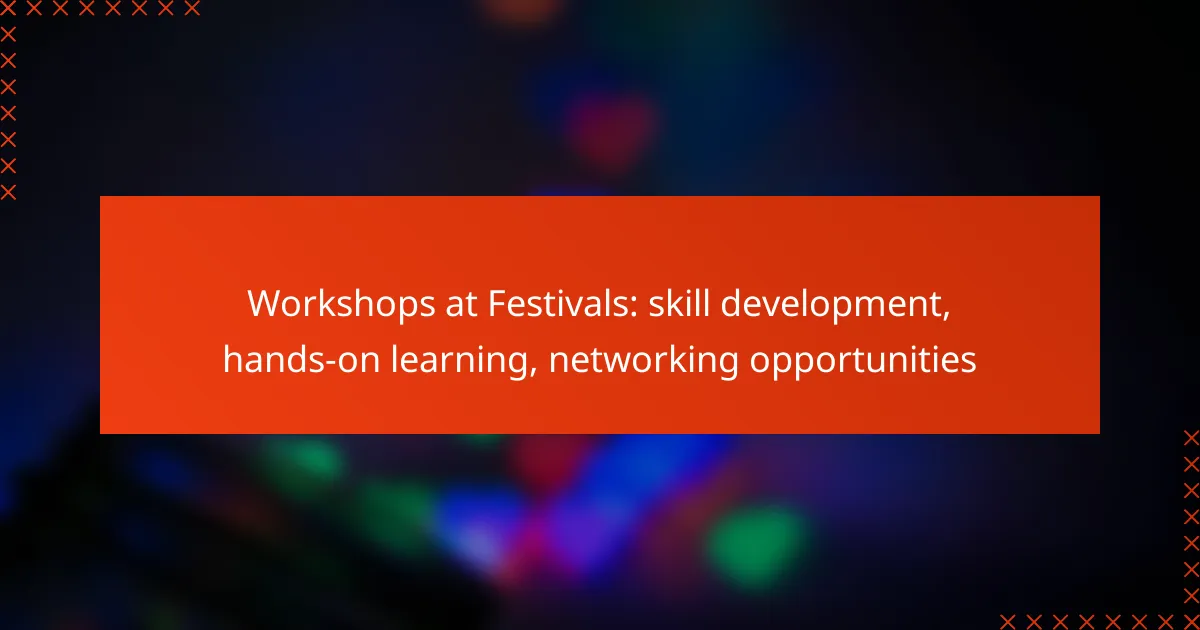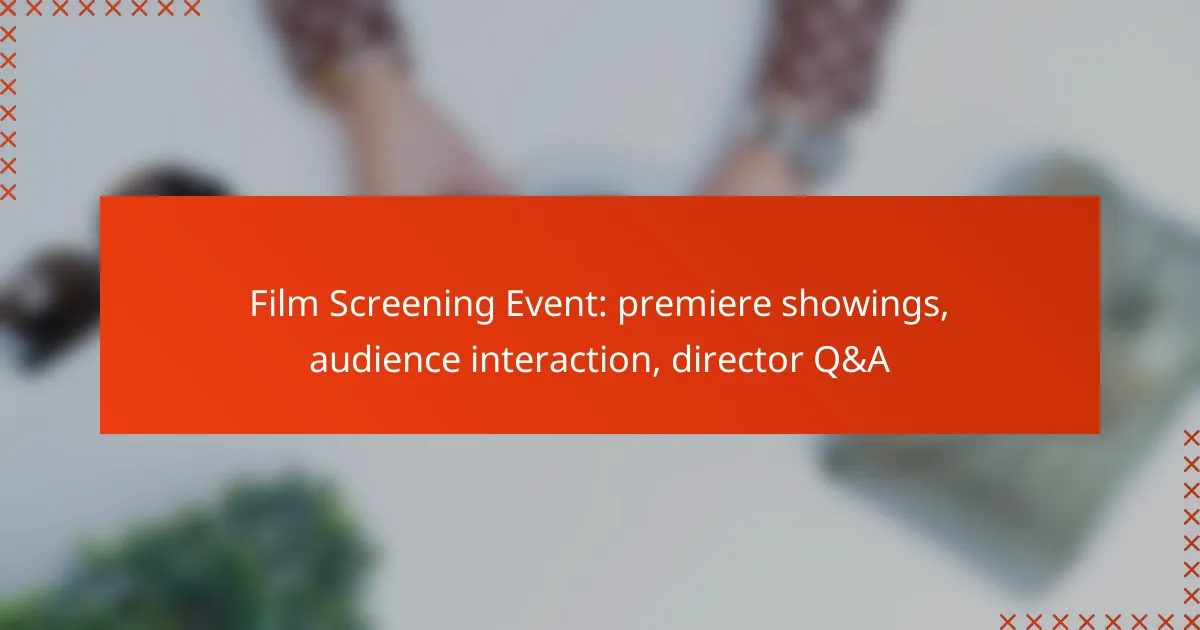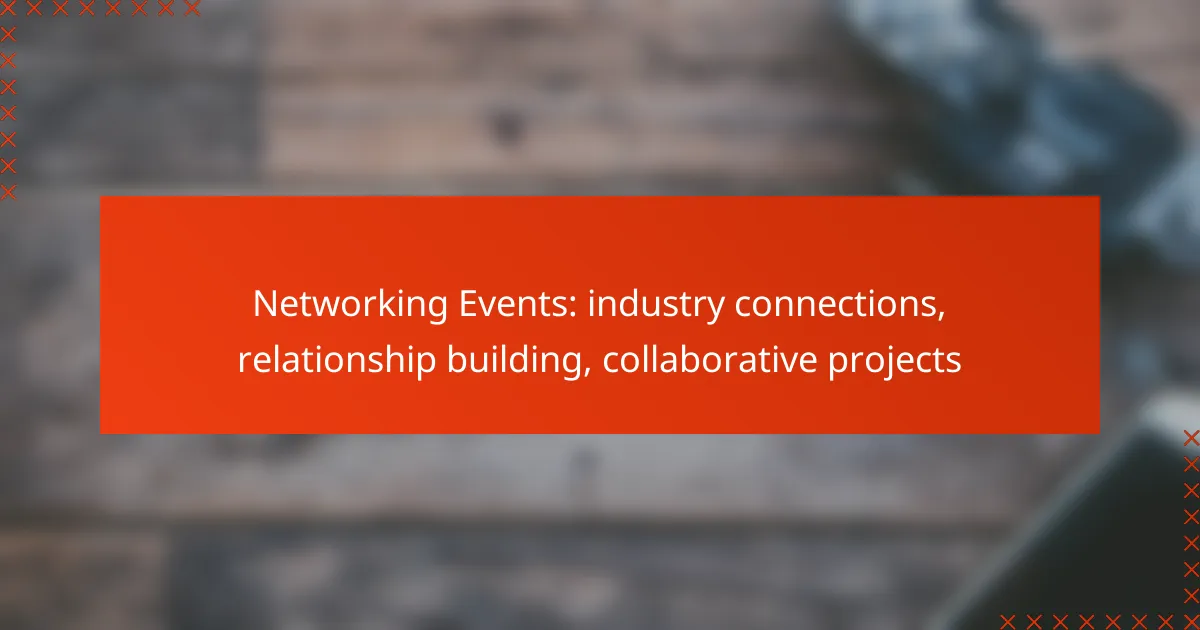Workshops at festivals in Australia provide a unique platform for skill development through hands-on learning experiences. Participants not only enhance their abilities but also have the opportunity to network with industry professionals and fellow attendees, fostering valuable connections for future collaborations.

What are the benefits of workshops at festivals in Australia?
Workshops at festivals in Australia offer significant advantages, including skill development, hands-on learning, and networking opportunities. Participants can enhance their abilities while connecting with industry professionals and fellow attendees, creating a rich environment for personal and professional growth.
Skill development through hands-on activities
Workshops provide a practical setting where participants can develop skills through direct engagement. By participating in hands-on activities, attendees can apply theoretical knowledge in real-world scenarios, which enhances retention and understanding. For example, a cooking workshop may allow participants to prepare dishes under the guidance of a chef, fostering culinary skills effectively.
To maximize skill development, choose workshops that align with your interests and career goals. Look for sessions that offer personalized feedback, as this can significantly improve your learning experience. Engaging in diverse activities can also broaden your skill set, making you more versatile in your field.
Networking opportunities with industry professionals
Festivals often attract industry leaders and experts, providing a unique chance to network. Workshops create informal settings where participants can interact with these professionals, ask questions, and gain insights into their fields. Establishing connections can lead to mentorship opportunities and potential collaborations.
To make the most of networking, come prepared with questions and a clear idea of what you want to achieve. Follow up with contacts after the festival to maintain relationships and explore further opportunities. Remember, networking is about building genuine connections, so be authentic in your interactions.
Access to diverse learning experiences
Workshops at festivals often cover a wide range of topics, allowing participants to explore new areas of interest. This diversity can introduce attendees to innovative techniques and perspectives that they may not encounter in traditional educational settings. For instance, a festival might feature workshops on digital marketing, sustainable practices, or creative writing.
Consider attending workshops outside your primary field to gain fresh insights and ideas. This cross-disciplinary approach can inspire creativity and innovation in your work. Additionally, learning from different instructors can expose you to various teaching styles and methodologies.
Community building among participants
Workshops foster a sense of community among participants, creating a supportive environment for learning and collaboration. Engaging in group activities encourages interaction, allowing individuals to share experiences and insights. This camaraderie can lead to lasting friendships and professional networks.
To strengthen community ties, participate actively in discussions and group projects during workshops. Consider joining follow-up groups or online forums related to the workshop topics to continue the conversation. Building relationships within this community can enhance your learning and provide ongoing support in your professional journey.
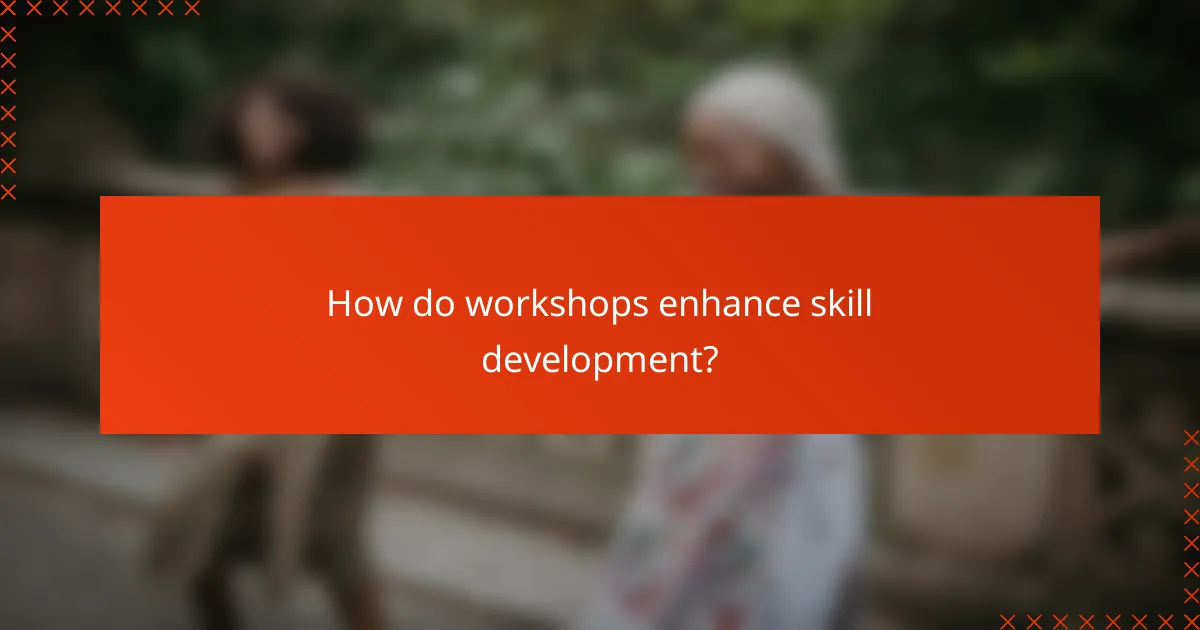
How do workshops enhance skill development?
Workshops enhance skill development by providing hands-on learning experiences that allow participants to apply what they learn in real-time. This practical approach not only solidifies theoretical knowledge but also fosters networking opportunities that can lead to future collaborations.
Practical application of theoretical knowledge
Workshops bridge the gap between theory and practice by allowing participants to implement concepts in a controlled environment. For example, a workshop on digital marketing may include live campaigns where attendees can create ads and analyze results. This direct application helps reinforce learning and builds confidence in using new skills.
Consider workshops that incorporate case studies or simulations, as these methods can effectively illustrate how theoretical principles operate in real-world scenarios. Engaging in such practical exercises can significantly enhance retention and understanding.
Personalized feedback from instructors
One of the key benefits of workshops is the opportunity for personalized feedback from experienced instructors. Unlike traditional classroom settings, workshops often allow for one-on-one interactions, where participants can ask questions and receive tailored advice on their work.
This feedback is crucial for identifying strengths and areas for improvement, enabling attendees to refine their skills more effectively. Look for workshops that emphasize instructor engagement to maximize this benefit.
Collaboration with peers on projects
Workshops often encourage collaboration among participants, which can lead to innovative ideas and solutions. Working alongside peers on group projects allows individuals to share diverse perspectives and learn from each other’s experiences.
Engaging in collaborative tasks not only enhances learning but also builds valuable networking connections. Consider forming small groups during workshops to tackle specific challenges, as this can foster a sense of community and support among participants.
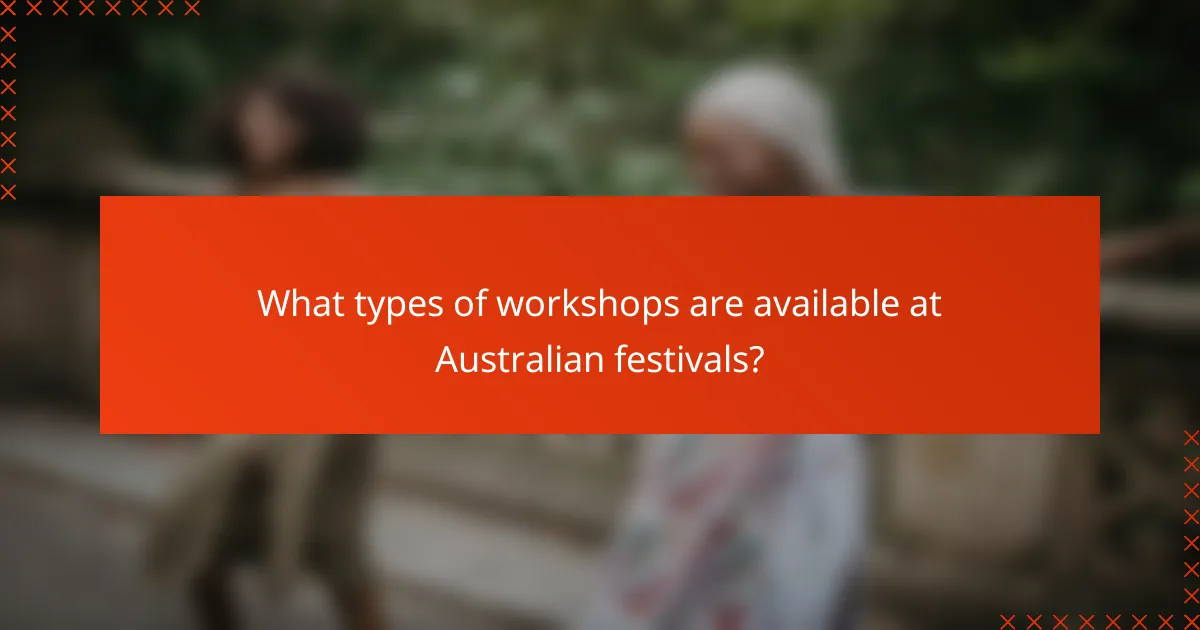
What types of workshops are available at Australian festivals?
Australian festivals offer a diverse range of workshops that cater to various interests, focusing on skill development, hands-on learning, and networking opportunities. Participants can engage in creative arts, technology, and wellness activities, enhancing their knowledge and connecting with like-minded individuals.
Creative arts and crafts workshops
Creative arts and crafts workshops at Australian festivals provide participants with the chance to explore their artistic side. These sessions often include activities like painting, pottery, and textile arts, allowing attendees to create tangible pieces of art while learning new techniques.
Workshops typically range from beginner to advanced levels, accommodating all skill sets. Participants should consider bringing their own materials or check if supplies are provided, as this can vary by event.
Technology and coding workshops
Technology and coding workshops focus on equipping attendees with essential digital skills. These workshops often cover topics such as web development, app creation, and data analysis, catering to both novices and experienced individuals looking to enhance their technical abilities.
Many festivals partner with local tech organizations to deliver these sessions, ensuring that the content is relevant and up-to-date. Participants should look for workshops that offer hands-on projects, as practical experience is crucial for mastering these skills.
Health and wellness workshops
Health and wellness workshops promote physical and mental well-being through various practices. Common offerings include yoga, meditation, and nutrition sessions, aimed at helping participants develop healthier lifestyles.
These workshops often emphasize interactive participation, encouraging attendees to engage in activities that foster relaxation and mindfulness. It’s advisable to wear comfortable clothing and bring any necessary equipment, such as yoga mats, to fully benefit from these experiences.
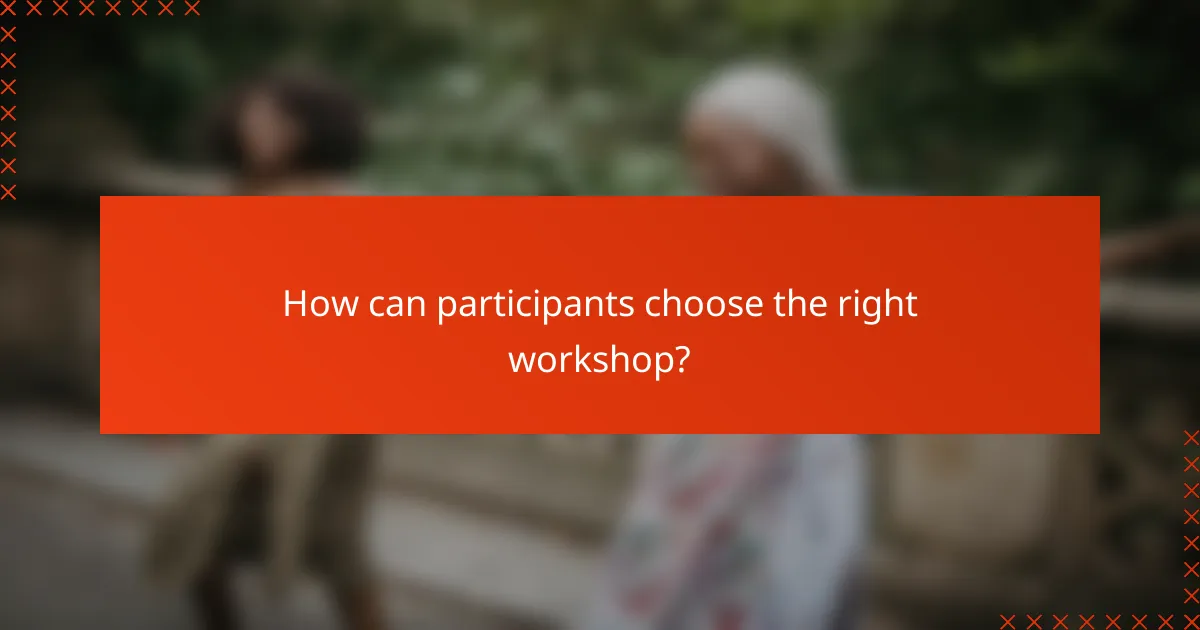
How can participants choose the right workshop?
Participants can choose the right workshop by evaluating their personal skill levels and goals, as well as researching the facilitators’ expertise. This approach ensures that the workshop aligns with their learning objectives and provides valuable insights from knowledgeable instructors.
Assess personal skill levels and goals
Understanding your current skill level is crucial when selecting a workshop. Consider whether you are a beginner, intermediate, or advanced in the subject area. This self-assessment will help you find workshops that match your experience and challenge you appropriately.
Next, define your goals for attending the workshop. Are you looking to gain foundational knowledge, enhance specific skills, or network with industry professionals? Clearly outlining your objectives will guide you in selecting the most relevant workshops.
Research workshop facilitators and their expertise
Investigating the background of workshop facilitators is essential. Look for their qualifications, experience, and previous workshops they have conducted. Facilitators with a strong track record and relevant industry experience are more likely to provide valuable insights and practical knowledge.
Additionally, consider reading reviews or testimonials from past participants. This feedback can give you a sense of the facilitator’s teaching style and effectiveness, helping you make a more informed decision about which workshop to attend.
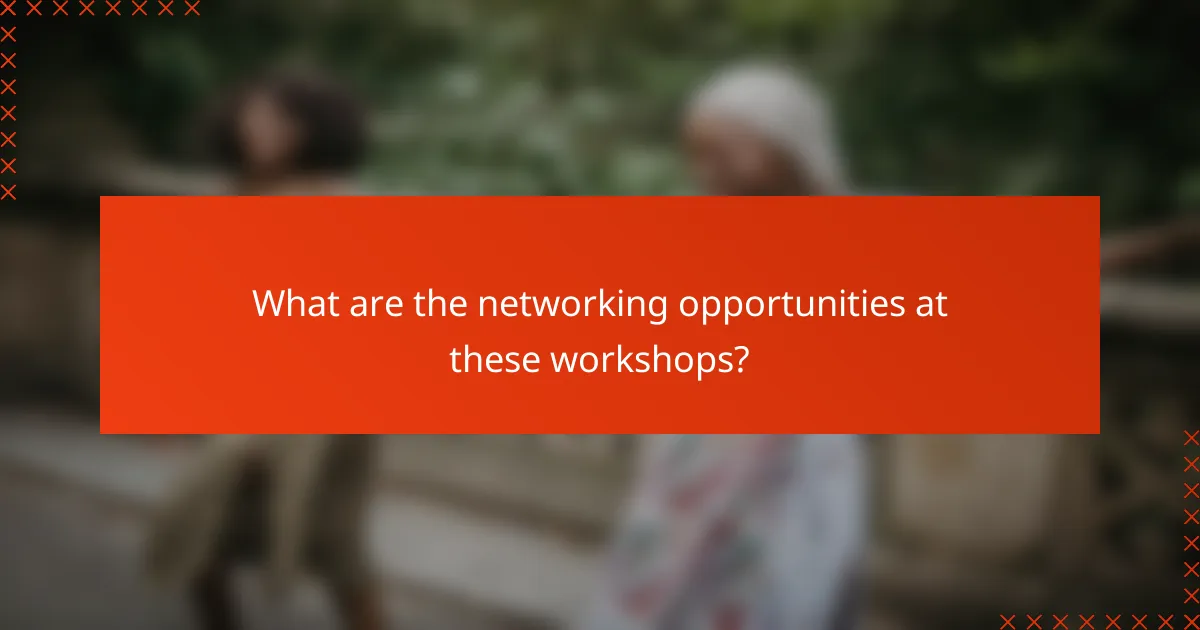
What are the networking opportunities at these workshops?
Workshops at festivals provide valuable networking opportunities by facilitating connections among participants, instructors, and industry professionals. These settings encourage collaboration and relationship-building, which can lead to future partnerships and career advancements.
Connecting with like-minded individuals
Attending workshops allows participants to meet others who share similar interests and goals. This environment fosters open discussions and idea exchanges, creating a sense of community. Engaging with peers can lead to collaborative projects and shared learning experiences.
To maximize these connections, consider joining group activities or discussions during the workshop. Actively participating in conversations can help you identify potential collaborators and expand your network.
Building relationships with mentors
Workshops often feature experienced professionals who can serve as mentors. These mentors provide guidance, share industry insights, and may even offer opportunities for internships or job placements. Establishing a rapport with them can be beneficial for your career development.
To effectively build these relationships, approach mentors with specific questions or topics for discussion. Follow up after the workshop with a thank-you note or email, expressing your appreciation for their insights. This can help solidify the connection and keep the lines of communication open.
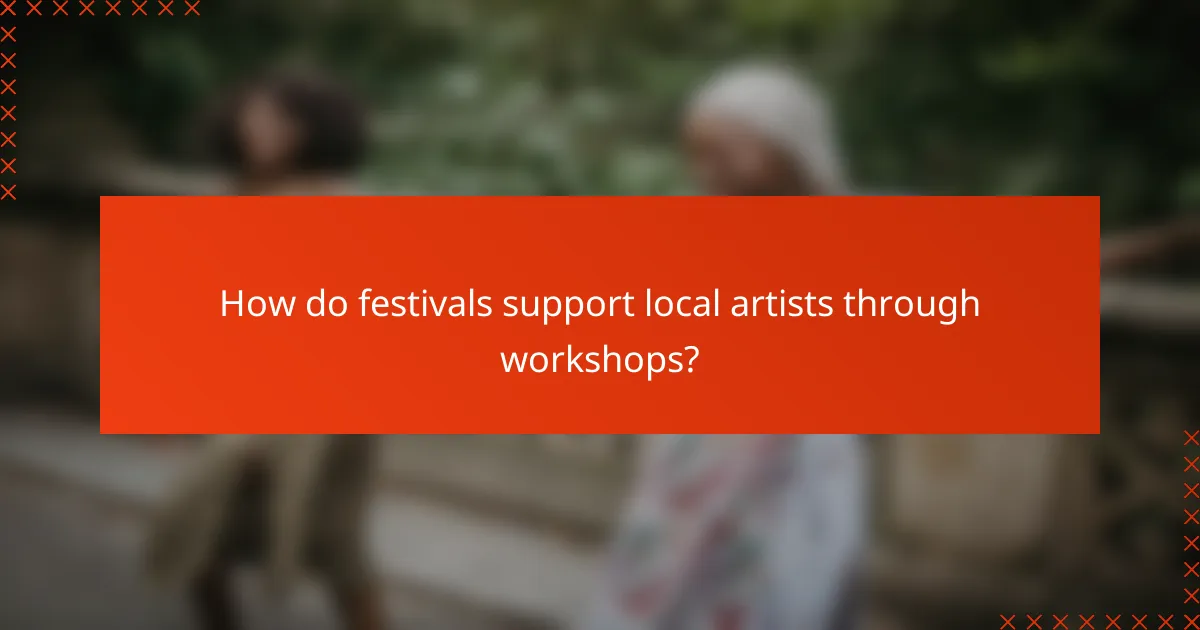
How do festivals support local artists through workshops?
Festivals support local artists by providing workshops that enhance skill development, facilitate hands-on learning, and create networking opportunities. These workshops allow artists to share their expertise while fostering community engagement and collaboration.
Showcasing local talent and skills
Workshops at festivals serve as a platform for local artists to showcase their unique talents and skills. By leading sessions, artists can demonstrate their techniques and share their creative processes with attendees, which helps to elevate their profile within the community.
Participants in these workshops often gain practical skills that can be applied in their own artistic endeavors. For example, a local painter might conduct a session on watercolor techniques, allowing attendees to experiment with materials and learn directly from an expert.
Additionally, showcasing local talent through workshops can attract media attention and potential buyers, further supporting the artists’ careers. This visibility can lead to future opportunities, such as collaborations or exhibitions, enhancing the local arts scene overall.
